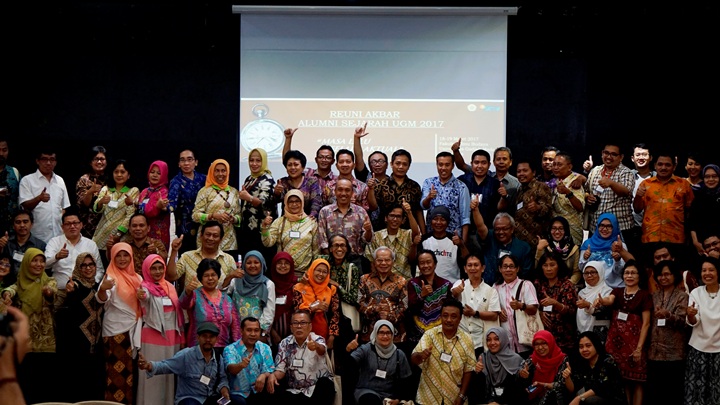
Saturday morning (18/3) the atmosphere in the courtyard of the Poerbatjaraka building, Faculty of Cultural Sciences, UGM was suddenly crowded. Several people were seen shaking hands and laughing. Not a few also hug. That day the History Department held a Grand Reunion. The event was held for two days, March 18-19 at the Faculty of Cultural Sciences UGM. Participants consisted of history alumni from various generations and strata. The organizing committee -which consists of several initiators from the alumni circle- carries the theme “The Past Is Always Actual”.
This reunion is aimed at maintaining communication between history alumni and the History Department of FCS UGM. In addition, the agenda of the Grand Reunion is to discuss the development of historical science, the historian’s profession and history in the creative industry. It was said by the chairman of the committee, Yudah Prakoso, that this reunion was not just a place to let go of longing. But we also discussed the development of historical scholarship. “So apart from the miss meeting, there was also a discussion that raised historical issues,” explained Yudah.
The series of Reunion events opened with speeches from several important figures. The Indonesian Director General of Culture, Hilmar Farid, attended the Grand Reunion and gave cultural speeches. Hilmar, who also serves as Chair of the Indonesian Historian Society (MSI) highlighted the historian’s profession and its future. Hilmar opened the question with, who deserves to be called a historian? Hilmar first distinguishes between history as a discipline and history (which is valuable) as a profession. The man who was born in Bonn, Germany, then concluded that someone called a historian is someone who uses the discipline of history in his profession. “A person who has a history profession is definitely a historian, but a historian is not necessarily someone who has a history profession,” explained Hilmar. According to Hilmar Farid, the theme of this reunion is very appropriate. The theme is good for encouraging someone from various professions but using the discipline of history to develop their field. “My dream in the future is that history is not a sub-field that is studied at universities, but can actually provide a perspective on many things,” he explained.
Apart from Hilmar Farid, this event was also attended by the Deputy of Political Communication and Information Dissemination of the Presidential Staff Office, Eko Sulistyo. He conveyed how the historical approach is used in the current government, especially in making strategic visions and policies for the government. Eko gave an example of how Trisakti’s vision became the foundation of the government regarding economic independence, political sovereignty, and cultural characteristics. “So the current government is a government that uses historical foundations as a reference. This is manifested in the spirit of his policies,” explained Eko.
Three Discussion Sessions
The series of events on the first day, after the oration was a series of discussions. Each discussion carries a theme. The discussion was held three times with different presenters and moderators. In the first session, the discussion carried the theme of the development of historical scholarship. Asep Syaiful Oeding (alumni) was appointed as moderator. Meanwhile, the presenters consisted of three academics across generations; Prof. Taufik Adullah (former chairman of LIPI), Prof. Bambang Purwanto, and Dr. Farabi Fakih. The last two names are lecturers from the host.
Meanwhile for the second discussion theme, regarding history and professions. The idea of the second session is to explain the function of history and its influence on the profession that is being practiced today. Kusuma Espe, one of the presenters, explained that the influence of historical knowledge was important in his career. He is now a career Army officer with the rank of Lieutenant Colonel. According to Kusuma, the culture of historical science requires careful and patient care, because dealing with archives affects performance on the field.
In the last series of discussions, the speakers came from alumni who were involved in the historical creative industry. Present as presenters of Sambodo who work as creatives for several national television programs, Muhammad Nursam (founder of Ombak publisher), and Erwin DJ (Founder of Malam Museum). Each of the presenters agreed that historical scholarship can expand its reach to various fields. However, the presentation must be different and acceptable to the community. Sambodo gave an example when he created an Opera Van Java event. Meanwhile, Erwin DJ, who works in the museum sector, said that learning history should not be rigid and boring. “That’s why I invite visitors to go to the museum at night. Then also make fun games,” explained Erwin.
The Grand Reunion event this time also managed to give a good outcome. Two books have been printed successfully. Each is a UGM history alumni directory book and a collection of alumni writings. Another result of this grand reunion is the formation of a forum for UGM history alumni. The forum was later named Kasagama. According to Komang Ananda, an alumni of 2010 history, it is hoped that through Kasagama, the network between the Department of History and alumni will be stronger. “This is good for continuing to build relationships, between the old and young generations, and also relations with the Department of History, in particular,” said Komang. (Sej/Bagus)
